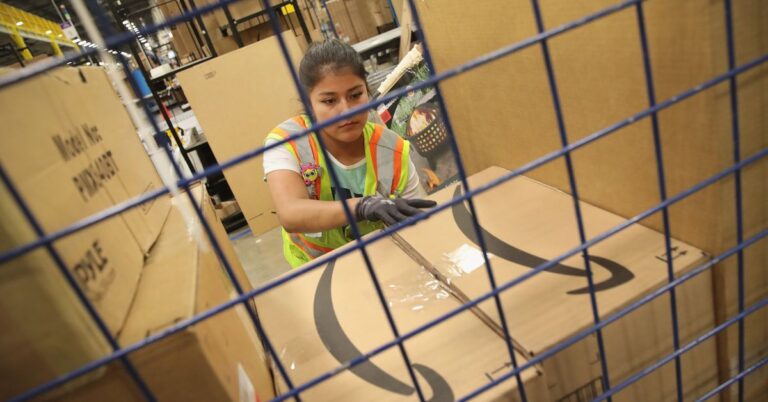
A Black Amazon senior manager and former economic policy adviser to Sen. Cory Booker is suing the tech giant and two of its current executives for alleged race and gender discrimination, and for allegedly violating the Equality Pay Act, according to a lawsuit filed in district court in Washington, DC, on Monday. The suit also alleges that a former Amazon executive sexually harassed and assaulted the employee.
Charlotte Newman, a senior manager who has worked in the Amazon Web Services division of the company since January 2017, told Recode in an interview that the discrimination began when she was first hired at a level lower for a public policy manager role than she applied for — and what she believes her qualifications justified.
She said the discrimination continued when she was denied a promotion for more than a year even though she was performing aspects of the more senior role and had begun pushing her manager to assign her to a higher level. She was elevated to a senior manager position in fall 2019, more than two and a half years after being hired. Newman said what made matters worse was that her first boss, an AWS director named Steve Block, employed what she believed were racial stereotypes in telling her that her communication style was “too direct,” and “just scary,” and that she “can intimidate people.”
Some of the alleged actions that Newman said were the most painful involve a former AWS director, Andres Maz, a senior colleague who at times assigned work to Newman. Newman alleges that Maz sexually harassed her on several occasions, including propositioning her for sex. The complaint also accuses Maz of sexual assault, including pressing on her lap near her genitalia and groping her thigh under a table at a work dinner, and on a later occasion yanking her long braided hair when she attempted to leave a post-work outing.
“There’s been deep emotional pain,” Newman said in an interview with Recode. “All of the hard work, all of the sacrifices I made, my education — none of that saved me from someone who’s a predator and living in fear of what else he might do.”
A third AWS executive, a vice president named Shannon Kellogg, who was Newman’s manager after Block, allegedly relied on feedback from Maz in his judgment of Newman’s performance, thus helping to create a work environment in which Newman felt unable to report the sexual harassment to her managers for fear of retaliation. The suit also alleges that Kellogg and Block “frequently complained about the personalities of other female employees, which is not their common practice regarding men under their supervision.”
Amazon spokesperson Doug Stone did not immediately reply to a request for comment on behalf of the company, Block, and Kellogg. Maz could not be reached for comment and an attorney believed to represent him did not immediately return messages seeking comment.
Newman’s suit was filed after Recode published an investigation last week that detailed allegations by Amazon employees that Black corporate workers face bias and an unlevel playing field where they receive lower performance ratings than non-Black peers and are promoted less frequently. Newman said the Recode report was one of the reasons she decided to speak publicly about her experience.
“I strongly believe that Amazon should be harnessing the light of diverse leadership rather than dimming the light of Black employees and other employees of color,” Newman said. “For years I had been sort of suffering in silence, [but] I’m sure there are a lot of people who now feel more empowered to add their voices to the story, and hopefully there’s some real change that occurs.”
Newman said the Recode investigation resonated for many reasons, including details of an Amazon hiring practice that some employees call “down-leveling” — or “de-leveling,” as her lawsuit refers to it. All 10 Black Amazon employees interviewed for the report told Recode that either they or a Black colleague they know were hired at a lower level than they believe their qualifications justified.
“It is not uncommon for women, and especially Black women, to have a role advertised at one level but extended an offer at a position that is lower,” former Amazon diversity manager Chanin Kelly-Rae told Recode in the investigation. An Amazon spokesperson previously said that it is common for down-leveling to happen, but that the practice occurs with candidates from all backgrounds.
Newman says she was taken aback by the original Amazon job offer at the lower level but accepted it because of the explanation that the scope of her work would be limited to “Level 6” responsibilities — in particular, that the job would only require her to do US-focused policy work. Newman said she also did not know of the allegations from other Amazonians that down-leveling may happen more often to Black women. Before joining Amazon, Newman, a Harvard Business School graduate, worked for three years for Booker, advising the New Jersey senator on economic policy issues. She previously worked for three other Congress members, all of whom served on the House Financial Services Committee.
But after interviewing for a senior manager role in AWS’s public policy division — Level 7 in Amazon’s hierarchy — that would have included work in both North and South America, she was ultimately offered a US-focused position at Level 6. Within months, though, she says she was assigned projects outside of the US. Newman said she eventually realized that several of her white Level 6 peers had less work experience than she did and lacked graduate degrees, and one allegedly received a promotion to Level 7 shortly after being hired. The suit claims the leveling error cost Newman millions, with the compensation difference between the levels growing exponentially since stock awards make up a significant portion of Amazon pay packages, and Amazon’s stock price has increased rapidly in recent years.
“Once I joined and talked to other people about their experiences, I began to hear that there was a view that Black employees, other underrepresented employees, and women were more often down-leveled,” she said.
Even after she says she began experiencing sexual harassment, Newman said she did not report it because she says Maz had not yet touched her, and she feared harming her new career at the company. After Maz allegedly groped her the next year and propositioned her, she altered how she traveled for work trips, and when and where she worked in the company’s DC offices. She says she wanted to avoid being caught alone with Maz, who was at times responsible for assigning her work as a more senior colleague, though he was not her official manager.
In June 2020, when the pandemic meant that Newman could work from home — and had time to come to grips with her experience — and as the US began experiencing a renewed reckoning over racial inequality after the police killings of Black Americans including Breonna Taylor and George Floyd, she decided she was tired of staying quiet. She filed internal complaints detailing her allegations of harassment and assault by Maz and the discrimination she says she experienced at Amazon.
Amazon conducted an investigation and eventually terminated Maz’s employment, and required Block to take training, according to the suit. But for several months between when she filed her internal complaints and learning of the investigation’s result, Newman says she was expected to attend virtual meetings attended by Maz.
“At the very least, Amazon could have better safeguards in place to protect employees,” she said. “A company of Amazon’s size should have clear guidelines about what happens if you report, hear what your rights are … [and] ensure that once you report you don’t have to be contacted by the person who harassed you.”
Late last year, Newman transferred to a new role in a different division of AWS because she feared retaliation from her superiors in the wake of her complaint. She said she has told company representatives that the only way she’d consider staying at Amazon long term is if the company makes some significant changes to its hiring and diversity programs, including banning or significantly altering the practice of “down-leveling” to fix employees’ complaints that it’s a racially biased process.
Newman is represented by Douglas H. Wigdor, a high-profile employment lawyer who represented six of the women who accused Harvey Weinstein of sexual abuse as well as more than 20 former Fox News employees in sexual harassment and racial discrimination suits against the network. He also at one time represented Tara Reade, the former staffer of then-Sen. Joe Biden, who in 2019 accused Biden of sexually assaulting her in 1993.
Wigdor said his current client has refused any settlement with Amazon that would bar her from speaking about her experience.
“As one of the largest and most powerful companies in the world, Amazon has a moral obligation to lead by example and promote a level playing field for all workers,” he said in a statement. “Sadly, though Amazon treats its Black employees like second-class citizens … Because of Ms. Newman’s bravery, we expect other current and former Black employees at Amazon will now have a voice to stand up to this discrimination and no longer suffer in silence.”






